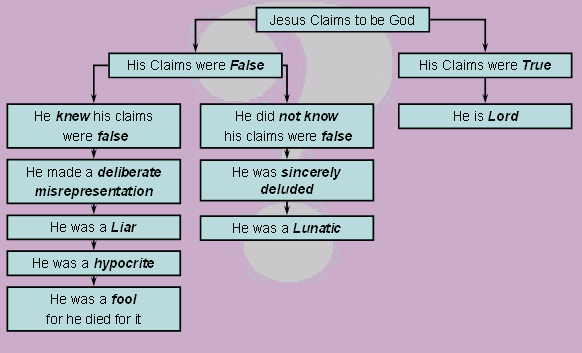
•The Identity Evidence
•Who Did Jesus Claim to Be?

John in this one verse tells us that Jesus (the Word):
–Jesus said to them, "My Father is always at his work to this very day, and I, too, am working." For this reason the Jews tried all the harder to kill him; not only was he breaking the Sabbath, but he was even calling God his own Father, making himself equal with God. (John 5:17- 18, NIV)
–Jesus answered . . . “I and the Father are one." Again the Jews picked up stones to stone him, but Jesus said to them, "I have shown you many great miracles from the Father. For which of these do you stone me?" "We are not stoning you for any of these," replied the Jews, "but for blasphemy, because you, a mere man, claim to be God.” (John 5:25- 33, NIV)
–In my vision at night I looked, and there before me was one like a son of man, coming with the clouds of heaven. He approached the Ancient of Days and was led into his presence. He was given authority, glory and sovereign power; all peoples, nations and men of every language worshiped him. His dominion is an everlasting dominion that will not pass away, and his kingdom is one that will never be destroyed. (Daniel 7:13-14, NIV)
–For the Son of Man is going to come in his Father's glory with his angels, and then he will reward each person according to what he has done. (Matthew 16:27, NIV)
–Jesus said to him, "Away from me, Satan! For it is written: 'Worship the Lord your God, and serve him only.'“ (Matthew 4:10)
–A man with leprosy came and knelt before him and said, "Lord, if you are willing, you can make me clean." (Matthew 8:2)
–Then the man said, "Lord, I believe," and he worshiped him. (John 9:38)
–Then those who were in the boat worshiped him, saying, "Truly you are the Son of God." (Matthew 14:33)
–The centurion Cornelius fell at the feet of Peter and “worshipped him” and Peter reproved him saying, "Stand up, I am only a man myself.“ (Acts 10:25-26)
–John fell at the feet of an angel in the book of Revelation to “worship him” and the angel said to John, "Do not do it! I am a fellow servant with you and with your brothers who hold to the testimony of Jesus. Worship God!” (Revelation 19:10)
Jesus is Jehovah
|
Of Jehovah |
Mutual Title or Act |
Of Jesus |
|
Is. 40:28 |
Creator |
John 1:3 |
|
Is 45:22; 43:11 |
Savior |
John 4:42 |
|
1Sam 2:6 |
Raise Dead |
John 5:21 |
|
Joel |
Judge |
John 5:27, cf. Mat. 25:31-46 |
|
Is. 60:19-20 |
Light |
John 8:12 |
|
Ex 3:14 |
I Am |
John 8:58, cf. 18:5-6 |
|
Ps. 23:1 |
Shepherd |
John 10:11 |
|
Is. 42:8 cf. 48:11 |
Glory of God |
John 17:1,5 |
|
Is. 41:4; 44:6 |
First and Last |
Rev. 1:17; 2:8 |
|
Hosea 13:14 |
Redeemer |
Rev. 5:9 |
|
Is. 62:5; Hosea 2:16 |
Bridegroom |
Rev 21:2, cf. Mat. 25:1ff |
|
Ps. 18:2 |
Rock |
1Cor. 10:4 |
|
Jer. 31:34 |
Forgiver of Sins |
Mark 2:7, 10 |
|
Ps. 148:2 |
Worshipped by Angels |
Heb. 1:6 |
|
Throughout O.T. |
Addressed in Prayer |
Acts 7:59 |
|
Ps. 148:5 |
Creator of Angels |
Col. 1:16 |
|
Is. 45:23 |
Confessed as Lord |
Phil. 2:11 |
 |
Who was Jesus?